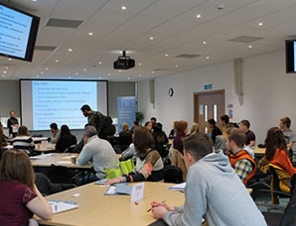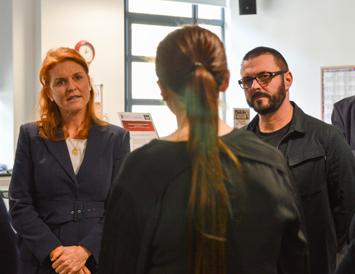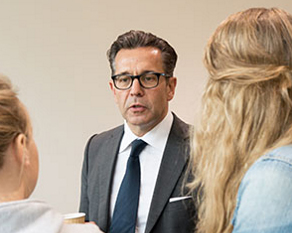24-Hour Design Challenge puts students through their paces

Mon, 22 Feb 2016 13:55:00 GMT
This year’s challenge centred on the Internet of Things and a project involving ‘electronic recycling’ took the honours
 ENTERPRISING University of Huddersfield students are being given plentiful opportunities to team up with others and turn their bright ideas into practical solutions.
ENTERPRISING University of Huddersfield students are being given plentiful opportunities to team up with others and turn their bright ideas into practical solutions.
First came a successful 24-hour Design Challenge in which 40 undergraduates studying a wide variety of subjects were formed into teams and given a day in which to find an innovative answer to a testing brief. The winners developed an intriguing new way to boost recycling of paper.
 The design challenge has been immediately followed by the latest edition of the University’s Honeypot, which enables students to pitch their ideas and recruit co-researchers with just the right set of skills. There is an innovation fund of £20,000 that could help the best ideas come to fruition.
The design challenge has been immediately followed by the latest edition of the University’s Honeypot, which enables students to pitch their ideas and recruit co-researchers with just the right set of skills. There is an innovation fund of £20,000 that could help the best ideas come to fruition.
In 2016, both the design challenge and the Honeypot launch have generated exceptional interest, said a delighted Dr Jess Power, who is Director of Teaching and Learning in the University’s School of Art, Design and Architecture. She is the academic lead for Honeypot and the Challenge, which was one of the most inspirational and open-ended so far, she added.
Participants in the 24-hour Design Challenge were second-year undergraduates and when they arrived at the launch they were formed into seven teams, with a careful balance between design, computing and engineering and business students. Then their design brief was revealed – the Internet of Things, which offered enormous scope.
After introductory sessions, including consultations with academic experts, the newly-formed teams brainstormed their ideas and embarked on developing and presenting them 24 hours later.
 The judging team was the University of Huddersfield’s Dr Violeta Holmes – who is Subject Area Leader for Electronic and Electrical Engineering – joined by regular judge David Bailey, Creative Director at the BBC User Experience and Design, GEL; plus Phil Morrison, who is Design Director at leading brand design consultancy Elmwood and the University of Huddersfield’s Director of Research and Enterprise, Professor Liz Towns-Andrews.
The judging team was the University of Huddersfield’s Dr Violeta Holmes – who is Subject Area Leader for Electronic and Electrical Engineering – joined by regular judge David Bailey, Creative Director at the BBC User Experience and Design, GEL; plus Phil Morrison, who is Design Director at leading brand design consultancy Elmwood and the University of Huddersfield’s Director of Research and Enterprise, Professor Liz Towns-Andrews.
After poring over the seven entries they chose a winner in the team of Heather Braddock (studying interior design), James Betts (graphic design and animation), Philippa Hazel (electrical engineering) and Alex Li (product design). They share £500 for impressing judges with their Blue Bin Project, which combines electronics with a recycle bin.
When students use it to recycle paper, they swipe it with their ID card. This enables data to be compiled showing which of the University’s academic schools is most diligent in recycling – with print credits being awarded to the school that comes out on top. University chiefs are impressed with the well thought-out and carefully-costed concept, so it could be put into practice.
The culmination of the 24-Hour Design Challenge came just as the Duchess of York (pictured above) was visiting the University’s 3M Buckley Innovation Centre, where it was based, and she took a close interest in all of the entries.
 The 2016 Honeypot was underway soon afterwards, at a party attended by about 100 students and staff from most of the University’s schools. Deputy Vice-Chancellor Professor Tim Thornton launched the project and the students discussed their ideas with academic experts.
The 2016 Honeypot was underway soon afterwards, at a party attended by about 100 students and staff from most of the University’s schools. Deputy Vice-Chancellor Professor Tim Thornton launched the project and the students discussed their ideas with academic experts.
Now students are registering themselves and their ideas online and at the close of February the Honeypot software will match them up with others whose skills are a fit with the project. Teams are formed and at Easter, votes will be cast to choose the most promising ideas. There will be an overall winner but all successful teams will be able to attend a special proof-of-concept mentoring day with Stefan Gabriel (pictured), a leading international business figure who is also Visiting Professor of Innovation at the University – the design projects are funded through Royal Academy of Engineering’s visiting professor scheme.
After this, the way will be open for teams to apply for cash from the Honeypot, to take their ideas to the next level.







